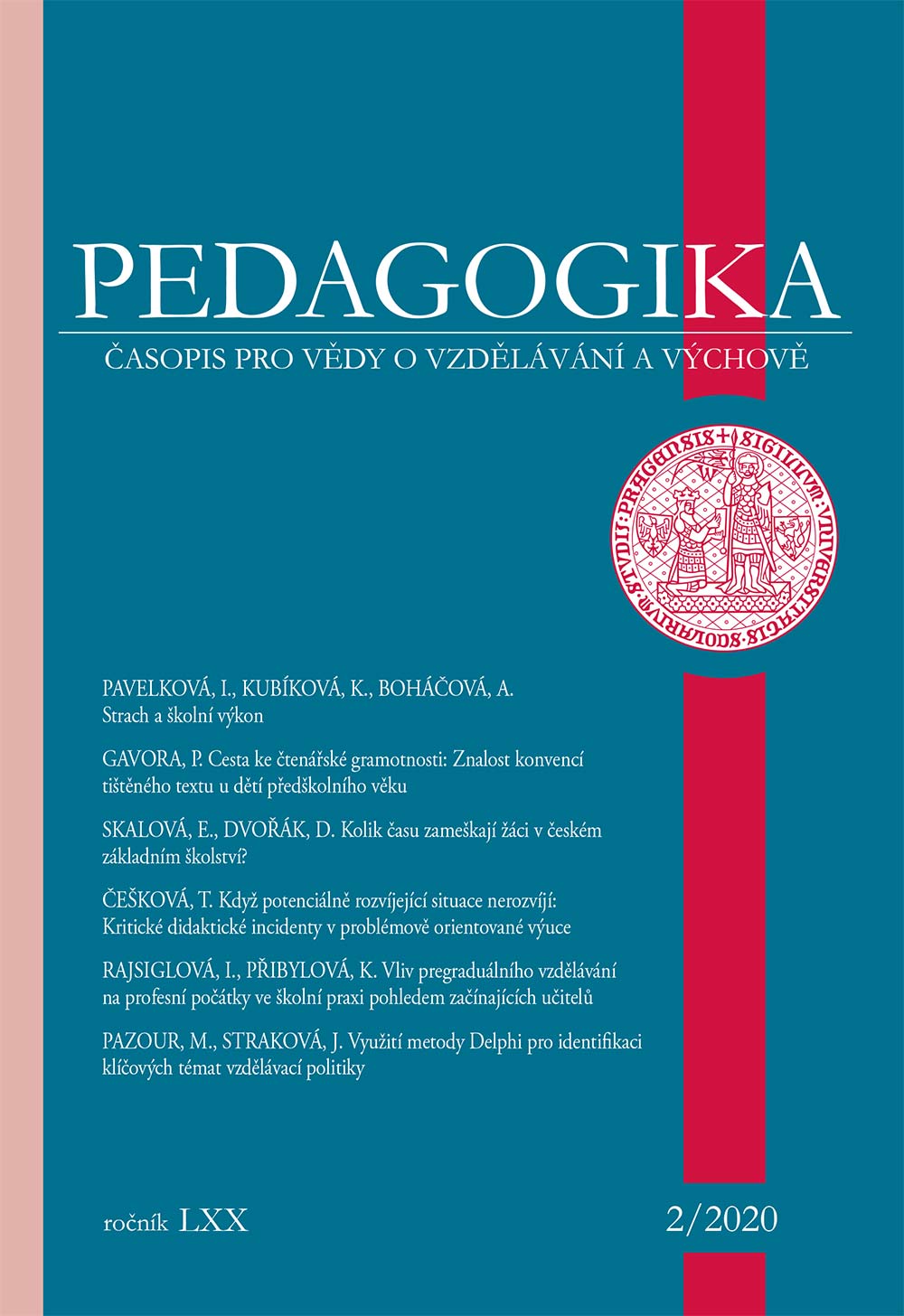Využití metody Delphi pro identifikaci klíčových témat vzdělávací politiky
DOI:
https://doi.org/10.14712/23362189.2019.1571Klíčová slova:
vzdělávací politika, vzdělávací systém ČR, empirické šetření, metoda DelphiAbstrakt
Cílem příspěvku je popsat postup, výsledky a zkušenosti aplikace metody Delphi v projektu „Identifikace prioritních témat ve vzdělávání“, který byl realizován na jaře roku 2019. Metoda Delphi se zpravidla využívá k vytváření konsenzu mezi experty, k analýze a lepšímu porozumění určité oblasti či ke generování návrhů opatření souvisejících s realizací konkrétních veřejných nebo firemních politik. V tomto konkrétním případě byla využita jako nástroj pro získání hlubšího vhledu do postojů a názorů vzdělávací komunity na nedostatky současného vzdělávacího systému v ČR.
Metody. Šetření metodou Delphi probíhalo elektronicky ve dvou kolech, v nichž bylo hodnoceno 39 výroků o nedostatcích systému vzdělávání z pohledu míry souhlasu či nesouhlasu a z hlediska významnosti pro pozitivní změnu ve vzdělávání. Šetření se zúčastnilo celkem 275 respondentů v prvním kole a 151 ve druhém kole. Tito respondenti reprezentovali velmi rozmanité spektrum aktérů systému vzdělávání v ČR.
Výsledkem šetření byl soubor námětů na témata a problematické oblasti, kterými by se měla zabývat současná a budoucí vzdělávací politika v ČR. Významným výstupem šetření je také soubor více než 10 000 komentářů k jednotlivým hodnoceným výrokům, které vysvětlují postoje respondentů k posuzovaným tématům.
Závěry. Šetření potvrdilo a kvantitativně doložilo hlavní závěry o nedostatcích v systému vzdělávání v ČR, které jsou v odborné komunitě dlouhodobě diskutovány. Současně přineslo širokou informační bázi o postojích ve vzdělávací komunitě. Z metodického hlediska jsou získané zkušenosti bezesporu příspěvkem do diskuse o přínosech a limitech metody Delphi uplatněné pro získání vhledu do postojů odborné komunity při formulaci veřejných politik.
Reference
Adler, M., & Ziglio, E. (1996). Gazing into the oracle: The Delphi method and its application to social policy and public health. London: Jessica Kingsley.
Aubusson, P., Panizzon, D., & Corrigan, D. (2016). Science education futures: "Great potential. Could do better. Needs to try harder". Research in Science Education, 46(2), 203-221.
https://doi.org/10.1007/s11165-016-9521-2
Brown, B. (1968). Delphi process: A methodology used for the elicitation of opinions of experts. Santa Monica: The RAND Corporation.
Clayton, M. J. (1997). Delphi: A technique to harness expert opinion for critical decisionmaking tasks in education. Educational Psychology, 17, 373-386.
https://doi.org/10.1080/0144341970170401
Franklin, K. K., & Hart, J. K. (2007). Idea generation and exploration: Benefits and limitations of the Policy Delphi research method. Innovative Higher Education, 31, 237-246.
https://doi.org/10.1007/s10755-006-9022-8
Gordon, T. J. (2003): The Delphi method. In J. C. Glenn & T. J. Gordon (Eds.), Future research methodology. Washington: Millennium Project.
Gupta, U. G., & Clarke, R. E. (1996). Theory and applications of the Delphi technique: A bibliography (1975-1994). Technological Forecasting and Social Change, 53(2), 185-211.
https://doi.org/10.1016/S0040-1625(96)00094-7
Hsu, C., & Sandford, B. A. (2012). The Delphi technique: Use, considerations, and applications in the conventional, policy, and on-line environment. In C. N. Silva (Ed.), Online research methods in urban and planning studies. Hershey, PA: IGI Global.
https://doi.org/10.4018/978-1-4666-0074-4.ch011
Hussler, C., Muller, P., & Ronde, P. (2011). Is diversity in Delphi panelist groups useful? Evidence from a French forecasting exercise on the future of nuclear energy. Technological Forecasting & Social Change, 78(9), 1642-1653.
https://doi.org/10.1016/j.techfore.2011.07.008
Jairath, N., & Weinstein, J. (1994). The Delphi methodology: a useful administrative approach. Canadian Journal of Nursing Administration, 7, 29-42.
Janeček, K. (2016): Democracy 2.1. (Online). Dostupné z https://uploads-ssl.webflow.com
Landeta, J. (2006). Current validity of the Delphi method in social sciences. Technological Forecasting & Social Change, 73, 467-482.
https://doi.org/10.1016/j.techfore.2005.09.002
Linstone, H. A., & Turoff, M. (Eds.) (1975). The Delphi method techniques and applications. Massachusetts, Reading: Addison-Wesley.
Lorusso, R., & Richards, K. (2018). Expert perspectives on the future of physical education in higher education. Quest, 70(1), 114-136.
https://doi.org/10.1080/00336297.2017.1359789
Loveridge, D. (2004). Use of the Delphi process in foresight studies. Background document for the course "Foresight for "beyond business as usual" (29. 6. - 3. 7. 2009), Manchester Institute of Innovation Research. (Nepublikováno).
Marchau, V., & de Linde, E. (1996). The Delphi method. In P. Van der Duin (Ed.), Foresight in organizations. methods and tools. New York. Routledge.
Maxey, D., & Kezar, A. (2016). Leveraging the Delphi technique to enrich knowledge and engage educational policy problems. Educational Policy, 30(7), 1042-1070.
https://doi.org/10.1177/0895904815586856
Nworie, J. (2011). Using the Delphi technique in educational research. TechTrends, 55(5), 24-30.
https://doi.org/10.1007/s11528-011-0524-6
Pazour, M., Pokorný, O., Pýchová, S., & Straková, J. (2019). Identifikace prioritních témat ve vzdělávání. Šetření metodou Delphi. (Online). Dostupné z www.skav.cz
Pollard, C., & Pollard, R. (2004). Research priorities in educational technology: A Delphi study. Journal of Research on Technology in Education, 37(2), 145-160.
https://doi.org/10.1080/15391523.2004.10782430
Powell, C. (2003). The Delphi technique: Myths and realities. Methodological Issues in Nursing Research, 41(4), 376-382.
https://doi.org/10.1046/j.1365-2648.2003.02537.x
PMid:12581103
Rice, K. (2009). Priorities in K-12 distance education: A Delphi study examining multiple perspectives on policy, practice, and research. Educational Technology & Society, 12(3), 163-177.
Rossouw, A., Hacker, M., & de Vries, M. J. (2011). Concepts and contexts in engineering and technology education: An international and interdisciplinary Delphi study. International Journal of Technology & Design Education, 21, 409-424.
https://doi.org/10.1007/s10798-010-9129-1
Steinert, M. (2009). A dissensus based online Delphi approach: An explorative research tool. Technological Forecasting & Social Change, 76(3), 291-300.
https://doi.org/10.1016/j.techfore.2008.10.006
Stewart, J. (2001). Is the Delphi technique a qualitative method? Medical Education, 35, 922-923.
https://doi.org/10.1111/j.1365-2923.2001.01045.x
PMid:11564193
Van Zolingen, S. J., & Klaassen, C. A. (2003). Selection processes in a Delphi study about key qualifications in Senior Secondary Vocational Education. Technological Forecasting & Social Change, 70(4), 317-340.
https://doi.org/10.1016/S0040-1625(02)00202-0
Weber, M., Rosa, A., Curaj, A., Gheorghiu, R., Dragomir, B., Cuhls, K., & Andreescu, L. (2017). New horizons. Data from a Delphi survey in support of future European Union policies in research and innovation - Study. Brussels, European Union.



